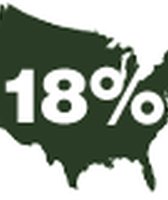Stand up for the facts!
Our only agenda is to publish the truth so you can be an informed participant in democracy.
We need your help.
I would like to contribute
(Editor's note: Bill Adair discusses ads from "super PACs and other political groups on NPR's All Things Considered.)
Ads from "super PACs" and other political groups targeting the 2010 midterm election are overwhelmingly spreading exaggerations and falsehoods, according to a fact-checking analysis by PolitiFact.
Of 31 claims in TV ads that PolitiFact has checked from groups such as American Crossroads and the Patriot Majority PAC, the vast majority have earned a Half True or lower rating on our Truth-O-Meter.
Forty-two percent earned a Half True, 23 percent Barely True and 13 percent were found to be False or Pants on Fire, the rating reserved for the most ridiculous falsehoods.
Only five of the 31 claims from the groups were rated Mostly True. Just two earned True ratings.
The poor record for accuracy holds when you include ratings for 20 additional ads from party groups such as the Democratic Congressional Campaign Committee and the Republican Governors Association. Of the claims we've checked from all groups, including those party organizations, 80 percent earned a Half True or lower.
Dozens of groups have sprung up in the past few months and spent tens of millions of dollars to influence elections for governor and key House and Senate seats. Many of the groups are funded by corporations after two recent Supreme Court decisions opened the door to more corporate spending. Other groups are operating under existing laws as tax-exempt organizations that can keep their donors secret.
Spending by the outside groups has favored Republican candidates by a large margin.
A report from the Wesleyan Media Project found that in the past five weeks, Republican-leaning organizations outspent Democratic-leaning groups by a margin of almost 9 to 1.
Two of the best-known groups are American Crossroads and Crossroads GPS, which are affiliated with Republican operatives Karl Rove and Ed Gillespie. The Crossroads record for accuracy is typical of the groups PolitiFact has rated. American Crossroads has received a Half True, a Barely True and a False, while two ads from Crossroads GPS both earned Barely True ratings.
Overall, PolitiFact's analysis found that ads by groups usually have a kernel of truth but twist or exaggerate the facts. A few of the typical distortions:
* In the Nevada Senate race, the liberal Patriot Majority PAC criticized Republican Sharron Angle for citing the retirement system in Chile as a model of how the U.S. Social Security system could be privatized. But the ad exaggerated the problems of the Chilean system and relied on overheated rhetoric and imagery. We rated it Barely True.
* In the Pennsylvania Senate race, Crossroads GPS took aim at Democratic Rep. Joe Sestak in an ad that claimed he "voted to gut Medicare, slashing benefits for Pennsylvania seniors." We found that was a significant exaggeration of the impact of Sestak's vote for the health care law because core Medicare benefits remain intact. We rated that Barely True.
* In the Texas governor's race, the liberal group Back to Basics incorrectly claimed that Gov. Rick Perry pushed for a law that lets insurance companies raise homeowners" rates without having to justify the increase. We rated that False.
* The conservative group Americans for Job Security targeted Democratic Rep. Zack Space of Ohio, claiming he supported "Nancy Pelosi's budgets and debt" and "job-killing energy taxes." We found the ad was incorrect on his vote on the debt limit and it mischaracterized the cap-and-trade plan Space supported. The ad earned a Half True.
PolitiFact's tally of the ad ratings is not scientific because we have not checked every ad nor every claim in each ad. Reporters and editors choose facts to check based on whether they believe voters will wonder about the accuracy of the statement. But we believe our analysis offers an illuminating overview of the relative accuracy of this year's ads.
PolitiFact and our partners in seven states -- Texas, Florida, Ohio, Rhode Island, Georgia, Wisconsin and Oregon -- have rated more than 1,000 claims from candidates and groups in the 2010 campaign. Nearly 200 of those Truth-O-Meter items are from TV ads or videos that have been checked as part of our Message Machine partnership with NPR.
Our Sources
Analysis of Truth-O-Meter items
Wesley Media Project, U.S. House and U.S. Senate advertising spending approaches $200M in last five weeks, $367M total since Jan 1, Oct. 13, 2010














































